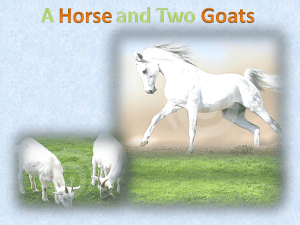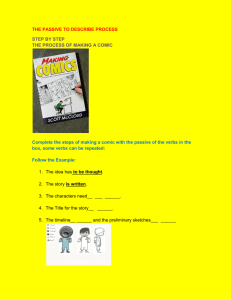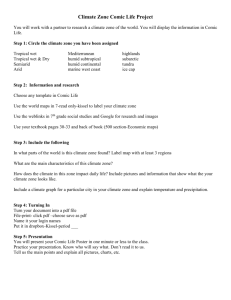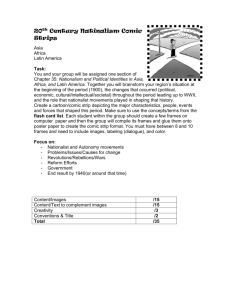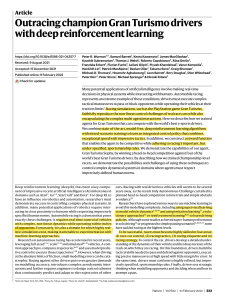Explore the change in the narrator's perspective in the story
advertisement
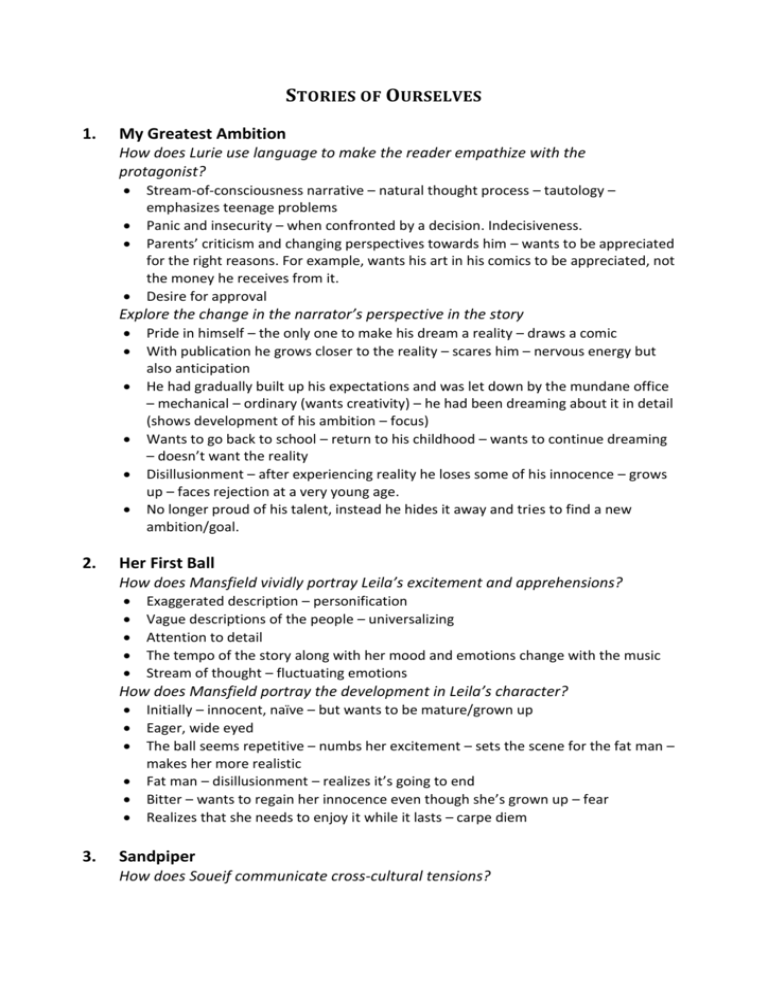
STORIES OF OURSELVES 1. My Greatest Ambition How does Lurie use language to make the reader empathize with the protagonist? Stream-of-consciousness narrative – natural thought process – tautology – emphasizes teenage problems Panic and insecurity – when confronted by a decision. Indecisiveness. Parents’ criticism and changing perspectives towards him – wants to be appreciated for the right reasons. For example, wants his art in his comics to be appreciated, not the money he receives from it. Desire for approval Explore the change in the narrator’s perspective in the story 2. Pride in himself – the only one to make his dream a reality – draws a comic With publication he grows closer to the reality – scares him – nervous energy but also anticipation He had gradually built up his expectations and was let down by the mundane office – mechanical – ordinary (wants creativity) – he had been dreaming about it in detail (shows development of his ambition – focus) Wants to go back to school – return to his childhood – wants to continue dreaming – doesn’t want the reality Disillusionment – after experiencing reality he loses some of his innocence – grows up – faces rejection at a very young age. No longer proud of his talent, instead he hides it away and tries to find a new ambition/goal. Her First Ball How does Mansfield vividly portray Leila’s excitement and apprehensions? Exaggerated description – personification Vague descriptions of the people – universalizing Attention to detail The tempo of the story along with her mood and emotions change with the music Stream of thought – fluctuating emotions How does Mansfield portray the development in Leila’s character? 3. Initially – innocent, naïve – but wants to be mature/grown up Eager, wide eyed The ball seems repetitive – numbs her excitement – sets the scene for the fat man – makes her more realistic Fat man – disillusionment – realizes it’s going to end Bitter – wants to regain her innocence even though she’s grown up – fear Realizes that she needs to enjoy it while it lasts – carpe diem Sandpiper How does Soueif communicate cross-cultural tensions? Metaphor – doesn’t want anything (sand) to change because of her (nature to change its course) – doesn’t want to cause change thus preventing her from successfully adapting. She doesn’t want to change it, because in the past she made major decisions in her life (Getting married to her husband, moving to Egypt), and these decisions ruined her life, trapping her in a loveless marriage in Egypt. She doesn’t want any more of her decisions to go horribly wrong. How her reactions to the same places (Africa & England) change – glitzy commercial (sunhat falling on her back, walking by the water) to harsh heat – nostalgia. To her, it had always been a temporary move to Egypt, she had thought they could move back whenever they felt like it – thus she never really tried to adapt to it. It was also impulsive (the way she walked in front of the crouching tiger ready to pounce) Her daughter grows into the Egyptian culture but she can’t, which makes her feel disconnected and creates a sense of regret – no duties anymore – no sense of responsibility or independence. Lack of independence - She was originally from London, where she lived in an apartment – did all her work herself, had a job to keep her occupied. Here she had a domestic maid to do all her work for her in her house, and she had no job. She couldn’t plan a meal, because all the meals in her house depended on which vegetables were most fresh. Woman’s position – feels inferior in society – inhibits her sense of creativity. When she came to the Middle East on a business trip, she was basically an “honorary man” because women didn’t usually work. Husband’s outlook towards her – she was no longer his only concern. When she first saw him care for his nephew, play backgammon with his father – she loved him for being a caring family man. She loved only him. But living in Egypt, he had lots of family to care for and love for. She did not want to share him, but to him she was one of many he had to look after. Thus she perhaps felt neglected. Expectations of her – she couldn’t adapt. He wanted to be at home in Egypt, but it wasn’t home for her. She still needed a mosquito net, her vegetables to be washed in permanganate. What he loved in her – her foreignness – had started to irritate him. Explore the ways in which Soueif uses symbolism Sandpiper: Grounded in the sensory world – restricted movement – depends less on imagination Poised between two worlds – belongs to neither – unfamiliarity of her situation Dependence on other birds – likes to feel needed Sandpiper doesn’t enter the water even though it stays close to it – apprehension/anxiousness regarding taking risks – entering the unknown Wants to stay close to the sea – wants be near a different life but is not prepared to enter into it – leave the comfort of the ground Beach: Trapped in the process of transition Its not wrong to take time and experience both worlds before making a transition Transfers her emotions and state of mind Water – her realm of thoughts which keep shifting with the circumstances – frantic/erratic Sand – her reality keeps meeting water and then shifting away – never constant Losing part of her reality to her imagination and part of her imagination to her reality – losing parts of herself Wants to explore both before making a decision 4. The Son’s Veto What makes Sophy a thought-provoking character? Hard working, selfless – to the extent of allowing herself to be controlled by the men in her life She’s bored because she has nothing to do all day – ends up making her hair for the longest time, and just looking out of the window. No activity to keep her busy, no job because she’s financially comfortable. Being a widow, and a woman not a lady, she does not fit in her society – no friends. Guilt and self-blame after moving to London – takes responsibility for her own infirmity, thus reader sympathizes with her especially since she’s the victim – she married the reverend out of respect, she was blamed by him for them having to move towns. Need to be loved – doesn’t feel like living when lonely, thus she’s lost the will to live. She doesn’t make the effort to walk, until Sam comes and gives her a reason to live by taking away her loneliness. Nostalgia for Sam and her former identity. She misses her village and her home, where she had friends (Sam) and family, and she was accepted for who she was. This is intensified because she has no one to talk to about her past, not even her son who doesn’t know or care about it. Strong maternal instinct that slowly destroys her identity. She wants to be accepted by her son, and loved by him. He on the other hand is embarrassed of her, and ridicules her by correcting her English and doesn’t want to be with her. Later on, he cares less for the happiness of his mother, and more of his own reputation when the question of her marrying Sam arises. Explore the ways in which Thomas Hardy presents his views about social class and prejudice Gender bias – women have no independence and are treated like domestic property – Sophy doesn’t receive the inheritance – son controls her financial assets, thus he controls her. Before her son her husband controlled her, and before that her parents. She had to get married at a young age, because women are not supposed to be a burden on their families. Mocks schooling (considered being of a higher class) – Randolph’s overriding concern for his reputation – no manners (cake on his mouth). Thus despite his upper-class “public schooling” and oxford education, his manners are questionable, and he is not infallible or perfect. If anything, it makes him less of a gentleman; by the way he threatens his mother and controls her life. He lacks respect for his elders. 5. Clergy – highly reputed but hypocrites – Randolph’s lack of emotion at Sophy’s death and his constant insults. The name of God traps Sophy in such a loveless, lonely life that she dies within a few years itself due to the lack of will to live. Rural/urban England – conflict between a woman and a lady. Makes Sophy feel like an outcast in urban society, makes her own son resent her for not being ladylike. The Rain Horse Explore how Hughes vividly builds up a sense of fear and mystery 6. Color – greys and blacks – dullness – creates a blurry effect – sharp details contrasted with the absence of feeling – almost blinding Isolation of the protagonist – no one around but the horse – increases the sense of desperate confusion. Also creates the possibility of it being an imagination, since nobody else seems to have encountered it. Thus questions the protagonists’ frame of mind at that moment. Tactile imagery – rain and storm – pathetic fallacy since it mirrors his panic. Emphasizes on tense, cold atmosphere – worry. Kinesthetic imagery – constant movement or lack thereof represents different states of mind – turmoil, therefore unstable thought process. Personification of nature enhances the effect of a supernatural presence – unexplained metaphors increase the mystery. Intensified by pathetic fallacy. The Destructors Explore the ways in which Graham Greene exposes the change in social structures in port World War II England Microcosmic level – T’s family has “come down” – misses the former luxuries that the war took away, especially since it all came to an end so fast, it was unexpected, and that’s what made its impact so much worse. Different regard of aesthetic beauty – scornful, resentful – symbol of hope (the house still standing) becomes a symbol of loss. Society lost all hope for improvement. Towards the end of the story, when the man sees Old Misery’s house crumbling – he isn’t surprised but instead he laughs. It was inevitable for the house to be torn down. Creation through destruction – tear down the walls of the house – symbol of destroying the foundations of pre-War society, wanted to create a world of equals. Shift of power and leadership – ruthless organization under T – loss of innocence and childhood – grown up before their time Depiction of money – formerly a necessity for survival and a possible luxury – now burnt until it turns to dust – sense of chaos – the form of financial organization and hierarchy is eradicated Lessened disparity between rich and poor - therefore everybody starts to interact with each other more (Trevor never would have if he was still rich). 7. The Horse and Two Goats How does Narayan portray the cultural conflict? Difference in language. Neither speaks the others. Try to communicate through gestures and expressions, but fail miserably as they are both misunderstood. Muni was old, and associated all foreigners with the British who ruled India for years. Thus the foreigner reminded Muni of his past, being oppressed by the British. Choice of clothing. ‘Khaki’ as worn by Britishers, and was a symbol of oppression and exploitation, whereas foreigners considered khakis comfortable for travelling. The foreigners ID card reminded Muni of a warrant, as he had never seen one before. Thus lifestyle in general differed greatly. The foreigner’s misconception that all Indians are religious. Muni did not speak English because he didn’t have any formal education, since he started working on the fields at a young age. To foreigners, Indians seem overly superstitious, and a lot of what they lack is assumed to be based on religion. By the tone in which the foreigner asked if Muni had any “spiritual scruples for avoiding the English speech”, one might suggest that the foreigner was mocking the Indian traditions, thus expressing contrast in understanding of each other’s backgrounds and cultures. In American culture – luxuries were abundant as compared to the Indian lifestyle. Thus the cigarette was such a surprise to Muni, and he cherished it. Awareness of society around them. In the USA modernization was taking place, and they drove cars and used lifts daily. Muni had never even dreamt of such technology, and never had the opportunity to use any. Never required it. Symbolism of the horse’s sculpture. To Muni it was his shade from the harsh sun, it was an average sculpture, common occurrence. But to the foreigner it was art, and he appreciated it. He was awed by its simplicity and craftsmanship. Thus showing how foreigners appreciate and understand art, Indians often do not (because many lack education, and are more worried about making a living – they do not get the opportunity to observe a lot of art pieces to admire) The differences bring out helplessness and frustration between the characters that puts forward a comic scene for the readers. 8. The Custody of the Pumpkin How does Wodehouse portray Lord Emsworth as a comic figure? Earl of Emsworth. Alliteration – E. Crass, inherent and obvious humor. Ridiculous. Lord Emsworth was fickle. One minute, a cow interested him – next minute he forgot all about it. He was absent-minded, for example when the Butler subtly mocked him for forgetting to take the telescope’s cap off. Later on, he was caught plucking flowers, and couldn’t find his umbrella or ID to prove it. He was childish, made his Butler and other workers do all his work for him. Dependent on them for everything. Misplaced sense of honor. He shows complete disregard for any royal duties he might need to carry out, and even neglects his own son – for his beloved pumpkin. This much affection for vegetable is absurd and thus creates humour. The way he mocks his son when talking to Aggie’s father. When he finds out that his son can work for Donaldson Dog Biscuits, his first thought is his son would work as a taster – thus subtly calling him a dog. Father-son relationship? Estranged relationship, due to vastly different characterization. Father has a misplaced sense of honor, cares more for his pumpkin than his son – perhaps even neglects his own son. Father has no faith in his son, and does not trust him. Thinks his son will flounder all their money away by marrying the wrong girl. Father speaks in classically informed drawing room English, whereas Freddie uses slang, calls his father “guvnor”. Freddie does not respect his father, he’s rude to him. 9. The Fly in the Ointment How does Pritchett communicate the conflict between father and son through characterization? Father is materialistic and cares only for money, power. Harold on the other hand does not yearn for success; he is content being a university lecturer. Father wants his son to have “big ideas” and wants to relive his success through his son, however his son doesn’t want what his father wants. Conflicting aims. Father shows concern through constant criticism, but son hates being criticized. He feels as though he is not good enough and not accepted by his father. Father is prim-proper. No money, but wears a navy blue suit and still cares for appearances. Son doesn’t care about his appearances, wears a shabby suit. Son his honorable, and respectful. He comes because he considers it his duty to help his father, who was going through a financially difficulty. Father on the other hand is unscrupulous, has no remorse for being corrupt – swindled money, lied to his family. He is proud of his business’ success. However son is embarrassed for his father. Son does not want his father to see him arrive for a taxi as then the father would ask for money and embarrass himself, and the son wanted to save his father the embarrassment. Son has more self-respect than his father. But the father saw no shame in talking about money, and the moment his son offered it to him – he demanded why the offer was not made sooner, thus he was thankless. He had no qualms taking anybody’s money – he was greedy. The father put on an artificial façade of change, by acting noble, humble and selfless but he hadn’t changed at all, and his aim all along had still been money. The son was honest, he hoped that his father would change his ways, “rising sun”, but he always knew his father too well to know he wouldn’t change. Thus they both are widely contrasting characters. They share an estranged relationship. They begin by speaking about superficial things, and try to avoid the sordid past. The moment their conflicts surface – they panic as they don’t want to raise the issues again. Son is afraid he’ll lose his cool and doesn’t want his father to lie anymore. 10. At Hiruharama Explore the ways in which Fitzgerald vividly conveys tensions between various characters Anticipation created by the pregnancy and shown by the passage of time in the doctor’s journey and the conversation with the doctor – foreshadows. when the concept of “death rate” is brought up, foreshadows a complication to arise. Constantly fluctuating emotions of Tanner (optimism, apprehension, panic, detachment) Social awkwardness of Brinkman and his eccentric character. Tension is not always dramatic, can also be comic tension, which Brinkman’s character lends. Lightens the atmosphere in the story. Situational irony – conflict with the context of events – Brinkman’s timing, story ends with an anticlimax. When Brinkman arrives, the author talks more about Brinkman than the pregnancy, thus the reader is anxious to know how the pregnancy is. Tension between the narrator and his grandfather (Tanner) – the way the rural lifestyle is depicted – also between the narrator and his audience (constant interruptions and justifications) How does Fitzgerald create a comic effect through the story? Simplicity of their lifestyle (shows water as a luxury, etc.) thus its absurdity creates a comic effect. Brinkman’s character – regards women as objects (“acquire”), loneliness, socially inhibited, rambling. Eccentric, unique. His erratic frame of mind, when the baby’s born his first thought was that there are more women in the world, rather than the wellbeing of the lady who just gave birth. Bathos – anticlimax created by two climaxes with the birth of each baby Situational irony – doctor arrives just in time, Brinkman arrives at the worst time. He doesn’t leave despite the fact that he was uninvited and his host was giving birth. Doesn’t take the hints. Narration – constant interruption, self explanatory.
